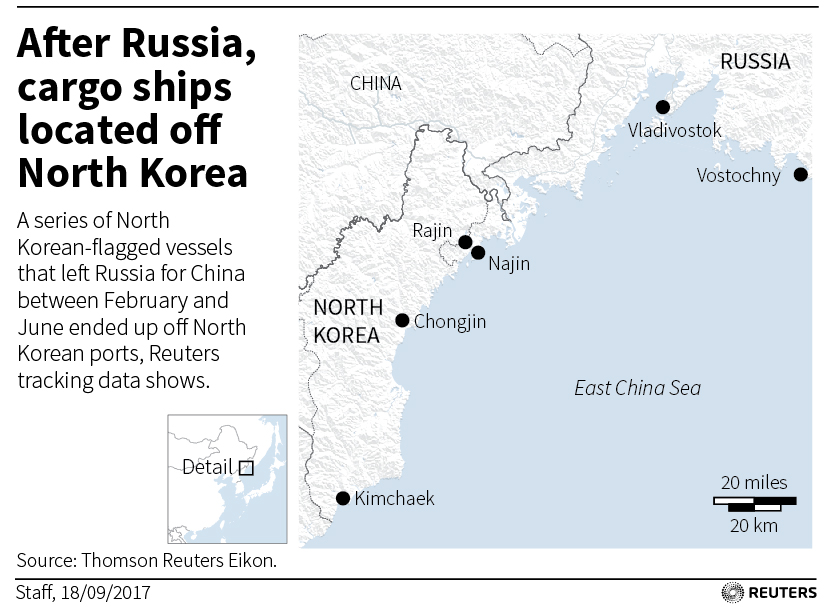
By Hyonhee Shin and Linda Sieg
SEOUL/TOKYO (Reuters) – Detonating a nuclear-tipped missile over the Pacific Ocean would be a logical final step by North Korea to prove the success of its weapons program but would be extremely provocative and carry huge risks, arms control experts said on Friday.
North Korean Foreign Minister Ri Yong Ho suggested leader Kim Jong Un was considering testing “an unprecedented scale hydrogen bomb” over the Pacific in response to U.S. President Donald Trump’s threat at the United Nations to “totally destroy” the country.
“It may mean North Korea will fire a warhead-tipped (intermediate range) Hwasong-12 or Hwasong-14 intercontinental ballistic missile and blow it up a few hundred kilometers above the Pacific Ocean,” said Yang Uk, a senior researcher at the Korea Defence and Security Forum in Seoul.
“They may be bluffing, but there is a need for them to test their combined missile-bomb capability. They could have already prepared the plan and are now trying to use Trump’s remarks as an excuse to make it happen,” said Yang.
Such an atmospheric test would be the first globally since China detonated a device in 1980, according to the International Atomic Energy Agency.
Tests of nuclear-tipped ballistic missiles are rarer still. The United States’ only test of an operational ballistic missile with a live warhead was fired from submarine far out in the Pacific Ocean in 1962.
China was widely condemned for a similar test with a missile that exploded over its Lop Nur test site in the country’s west in 1966.
North Korea’s six nuclear tests to date have all been underground, the most recent earlier this month by far its largest.
“We have to assume they *could* do it, but it is exceedingly provocative,” said Vipin Narang, an associate professor of political science at Massachusetts Institute of Technology.
“To put a live nuclear warhead on a missile that’s only been tested a handful of times, overflying potentially populated centers. If it…doesn’t go exactly as planned….it could be a world changing event.”
North Korea has fired two ballistic missiles over Japan’s north Hokkaido region in the past month as part of a series of tests that experts say have illustrated unexpectedly rapid advances.
“They said Pacific Ocean, which pretty much means firing a missile over Japan,” said Melissa Hanham, a senior research associate at the U.S.-based Middlebury Institute of International Studies at Monterey, California. “They want to shut us all up for doubting they could build it.”
SERIOUS FALLOUT
While a missile would be the most ideal means of delivery, it is also possible to put a bomb on a ship and detonate on the surface of the ocean or in the sea, the experts said.
Either way, the radioactive fallout could be significant, as well as the diplomatic backlash from around the world. North Korea’s recent missile launches over Japan especially drew stern rebukes from Tokyo and the international community.
Japan’s Chief Cabinet Secretary Yoshihide Suga called Pyongyang’s remarks and behavior “completely unacceptable”.
Narang said a test high enough over the ocean would limit the radioactive fallout but risks included damage from an electro-magnetic pulse, something Pyongyang has hinted it might employ on an attack on the United States or its allies.
“If it doesn’t go exactly as planned and the detonation occurs at a lower altitude we could see some EMP-like effects for anything in the area. A lot of dead fish too.”
Pyongyang has launched dozens of missiles this year as it spurs a program aimed at mastering a nuclear-tipped missile that can strike the United States, in addition to its Sept 3 nuclear test.
If Kim’s threat materializes, it will be a “tipping point” for China, and may prompt many other countries to demand an “end to the regime,” said David Albright, founder of the non-profit Institute for Science and International Security in Washington.
“No one has tested above ground for decades and the radioactive fallout could be terrifying to many,” Albright said.
Other experts said such an atmospheric nuclear test is unlikely for now due to its substantial technical and diplomatic risks.
Joshua Pollack, editor of the Washington-based Nonproliferation Review, said it would be an “end-to-end demo of everything.”
“But I would be surprised if this were their very next move. They have yet to test an ICBM at full range into the Pacific,” said Pollack. “That will probably come first.”
(Reporting by Hyonhee Shin in Seoul and Linda Sieg in Tokyo; Additional reporting by James Pearson in Seoul, Nobuhiro Kubo and Timothy Kelly in Tokyo, and David Brunnstrom in Washington; Editing by Lincoln Feast)










